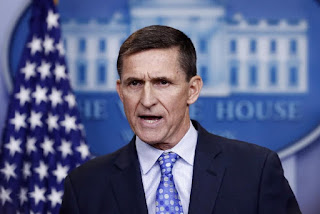Trump national security adviser Michael Flynn resigns
WASHINGTON
(AP) — President Donald Trump's embattled national security adviser
Michael Flynn resigned late Monday night, following reports that he had
misled Vice President Mike Pence and other officials about his contacts
with Russia. His departure upends Trump's senior team after less than
one month in office.
In
a resignation letter, Flynn said he held numerous calls with the
Russian ambassador to the U.S. during the transition and gave
"incomplete information" about those discussions to Vice President Mike
Pence. The vice president, apparently relying on information from Flynn,
initially said the national security adviser had not discussed
sanctions with the Russian envoy, though Flynn later conceded the issue
may have come up.
The
revelations were another destabilizing blow to an administration that
has already suffered a major legal defeat, botched the implementation of
a signature policy and stumbled through a string of embarrassing public
relations missteps.
Trump
on Monday named retired Lt. Gen. Keith Kellogg as the acting national
security adviser. Kellogg had previously been appointed the National
Security Council chief of staff and advised Trump on national security
issues during the campaign. Trump is also considering former CIA
Director David Petraeus and Vice Admiral Robert Harward, a U.S. Navy
SEAL, for the post, according to a senior administration official.
The
Trump team's account of Flynn's discussions with the Russian envoy
changed repeatedly over several weeks, including the number of contacts,
the dates of those contacts and, ultimately, the content of the
conversations.
Last
month, the Justice Department warned the Trump administration that
Flynn could be in a compromised position as a result of the
contradictions between the public depictions of the calls and what
intelligence officials knew to be true based on recordings of the
conversations, which were picked up as part of routine monitoring of
foreign officials communications in the U.S.
An
administration official and two people with knowledge of the situation
confirmed the Justice Department warnings on the condition of anonymity
because they were not authorized to discuss the matter publicly. It was
unclear when Trump and Pence learned about the Justice Department
outreach.
The
Washington Post was the first to report the communication between
former acting attorney general Sally Yates, a holdover from the Obama
administration, and the Trump White House.
Even
before the Post report, the White House was signaling that Flynn's
future was in doubt. White House spokesman Sean Spicer said Trump was
"evaluating the situation" and consulting with Pence on Monday about his
conversations with the national security adviser.
Asked
whether the president had been aware that Flynn might have discussed
sanctions with the Russian envoy, Spicer said, "No, absolutely not."
Trump,
who comments on a steady stream of issues on his Twitter feed, had been
conspicuously silent about the matter since The Washington Post
reported last week that Flynn had discussed sanctions with the Russian
envoy. A U.S. official told The Associated Press that Flynn was in
frequent contact with Ambassador Sergey Kislyak on the day the Obama
administration slapped sanctions on Russia for election-related hacking,
as well as at other times during the transition.
Flynn's
discussions with the Russian raised questions about whether Flynn
offered assurances about the incoming administration's new approach.
Such conversations would breach diplomatic protocol and possibly violate
the Logan Act, a law aimed at keeping citizens from conducting
diplomacy.
Earlier
Monday, White House counselor Kellyanne Conway said Trump had "full
confidence" in Flynn, though her assertions were not backed up by other
senior Trump aides.
Flynn
was spotted near the Oval Office just after 10 p.m. Monday. Amid the
uncertainty over Flynn's future, several of the president's top
advisers, including chief of staff Reince Priebus and counsel Don
McGahn, ducked in and out of late-night meetings in the West Wing.
Several
House Democrats called on Oversight Committee Chairman Jason Chaffetz,
R-Utah, to launch an investigation into Flynn's ties to Russia. House
Democratic leader Nancy Pelosi called for Flynn to be fired, saying he
"cannot be trusted not to put Putin before America."
Republican
Sen. Susan Collins of Maine said that if Pence were misled, "I can't
imagine he would have trust in Gen. Flynn going forward." She said it
would also be "troubling" if Flynn had been negotiating with a foreign
government before taking office.
It's
illegal for private citizens to conduct U.S. diplomacy. Flynn's
conversations also raise questions about Trump's friendly posture toward
Russia after U.S. intelligence agencies concluded that Moscow hacked
Democratic emails during the election.
Flynn's
resignation comes as Trump and his top advisers seek to steady the
White House after a rocky start. The president, who seeks input from a
wide range of business associates, friends and colleagues, has been
asking people their opinions on his senior team, including Spicer and
Priebus.
Advisers
have privately conceded that the White House spit out too many
disparate messages in the first few weeks, though they also note that
the president's own tweets sometimes muddy the day's plans before most
of the White House staff has arrived for work.
Trump
voiced support for Priebus Monday, saying the chief of staff was doing,
"not a good job, a great job." But he did not make a similar show of
support for his national security adviser.
Flynn
sat in the front row of Trump's news conference with Canadian Prime
Minister Justin Trudeau earlier Monday. The president did not receive a
question about Flynn's future from the two reporters who were called
upon, and he ignored journalists' shouted follow-up inquiries as he left
the room.
Over
the weekend, Trump told associates he was troubled by the situation,
but did not say whether he planned to ask Flynn to step down, according
to a person who spoke with him recently. Flynn was a loyal Trump
supporter during the campaign, but he is viewed skeptically by some in
the administration's national security circles, in part because of his
ties to Russia.
In
2015, Flynn was paid to attend a gala dinner for Russia Today, a
Kremlin-backed television station, and sat next to Russian President
Vladimir Putin during the event.
Flynn
spoke with the vice president about the matter twice on Friday,
according to an administration official. The official said Pence was
relying on information from Flynn when he went on television and denied
that sanctions were discussed with Kislyak.
Kellogg
takes the helm of the National Security Council at a time when the
young administration is grappling with a series of national security
challenges, including North Korea's reported ballistic missile launch.
The president, who was joined at his Mar-a-Lago estate by Japanese Prime
Minister Shinzo Abe over the weekend, voiced solidarity with Japan.
The
White House is also dealing with fallout from the rocky rollout of
Trump's immigration executive order, which has been blocked by the
courts. The order was intended to suspend the nation's refugee program
and bar citizens of seven Muslim-majority countries from entering the
United
States.
___
Associated
Press writers Catherine Lucey and Matthew Daly in Washington and
Jonathan Lemire in New York contributed to this report.



Comments
Post a Comment